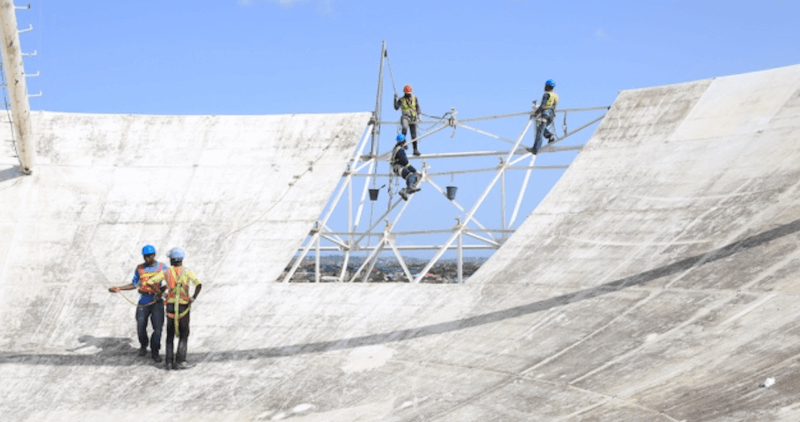African undercover journalists work with police to expose wrongdoings
JOHANNESBURG—Just as Rosemary Nwaebuni lay down on a makeshift operating table in the back of a Nigerian bar for an illegal abortion, police burst in to arrest the unlicensed doctor.
Ms. Nwaebuni, who is in her early 40s, wasn’t pregnant; she is a journalist had called the police herself.
These types of stings, which she and her crew staged multiple times in September and October at the makeshift offices of various suspected quack doctors, place her among a new breed of African investigative journalists, some of whom have been helped by officials who might have persecuted them in the past.
For some in journalism academia and the West, these partnerships between reporters and often-corrupt law-enforcement officials—one target got away, Ms. Nwaebuni said, because he was tipped off by the police—raise questions about journalistic independence.
But Ms. Nwaebuni and her peers say these joint ventures, supported by the infrastructure of larger, international news organizations, are one of the few ways to pursue dangerous investigations and get results in some of Africa’s more chaotic and politically oppressed countries.
“We collaborate with the police because we have the support,” Ms. Nwaebuni says. Her exposé on illegal abortions and quack doctors in Nigeria appeared on Al Jazeera. “If I didn’t have those resources…it would be pretty difficult to pull through the investigative projects, considering their high financial demands, difficulties and challenges.”
Jonathan Ossoff, managing director of U.K.-based Insight TWI Ltd., a documentary film and television producer, has helped Ms. Nwaebuni and others produce segments for Al Jazeera’s series “Africa Investigates.” He says he encourages them to work with local authorities to magnify the impact of their investigations.
“We have more-sophisticated investigative capabilities than a lot of the local police forces do,” Mr. Ossoff said. “But ultimately, only they can enforce the law.”
Investigations like Ms. Nwaebuni’s, which resulted in multiple arrests, have helped to popularize undercover journalism, with a small-but-growing crop of reporters across the continent pursuing increasingly risky stings to expose wrongdoings, which are then punished in a quid pro quo relationship with members of the establishment.
But the trend is worrying to some.
“In countries where journalistic resources and institutions are weak and resources are few, sometimes you find corners being cut,” said Anton Harber, a journalism professor at the University of the Witwatersrand in Johannesburg. “Anywhere in the world, journalists’ relationship with the authorities, particularly the police, is a complicated one where journalists have to tread very carefully.”
One reason some journalists are willing to consider such arrangements is to mitigate the risks still inherent to practicing journalism in Africa. At the end of 2014, 47 reporters were in prison across sub-Saharan Africa, according to the New York-based Committee to Protect Journalists, almost double the number jailed five years ago. Some 165 African journalists have fled their countries in the past five years, CPJ says.
“It’s really only the major international networks that will take on some of these documentaries. A lot of the local media won’t touch it,” for fear of backlash from the authorities, said Salim Amin, co-founder of A24 Media, an independent, pan-African 24-hour news channel. “It is really, really hard to get access to those people and tell those stories.”
Among the most prominent undercover journalists is Ghana’s Anas Aremeyaw Anas. He has posed as a brothel janitor, a mental patient and a dealer of body parts from human Albinos, who are persecuted in some parts of Africa because people believe they hold magical powers. He also worked with Ms. Nwaebuni on her abortion exposé.
“This model is a product of the society,” said Mr. Anas, who never appears in public without a disguise, both to protect himself and preserve the secrecy of his investigations. “At the end of the day, the goal is the same, so why can’t I collaborate with the prosecutor?”
He is co-owner of the New Crusading Guide, a Ghanaian newspaper, and his work has appeared on major international platforms, including CNN and Al Jazeera. He has exposed cocoa smugglers’ ties with Ghana’s security forces and a sex-trafficking ring that brought Chinese girls into Ghana. In 2008, the U.S. State Department gave him its “Heroes to End Modern Day Slavery” award.
“Going undercover, getting information and all those things, already [journalists] have been trained in that area,” said Patience Quaye, head of the Ghanaian police’s anti-human-trafficking unit, who has worked with Mr. Anas and other journalists. “They are able to uncover a lot of things that we would find difficult to penetrate.”
Recently, the police held a training session so law enforcement could adapt some of the strategies.
Still, Ms. Quaye doesn’t see the collaboration with journalists ending soon.
“They have a lot of equipment that we don’t have,” she said, while the government sometimes has funding or technology the journalists lack. “We have seen that one institution cannot fight alone this type of organized crime. That is why we work in partnership.”
“That collaboration and networking has been so effective and so good,” Ms. Quaye said.
In Zimbabwe, freelance journalist Stanley Kwenda started investigative work four years ago. His first deep dive, an inquiry into suspicious deaths after disputed presidential elections in 2008, forced him to flee the country for three months after he said one of the targets of his investigation threatened his life. Since then, he has changed his tactics.
“I was identifying myself less as a journalist,” he said. For a 2012 story with Insight TWI, Mr. Kwenda worked with Tendai Biti, Zimbabwe’s finance minister at the time, to investigate where proceeds from the country’s diamond sales were going.
Mr. Kwenda traveled to the Seychelles and posed as an illicit diamond dealer and used hidden cameras to reveal a shadowy world of international diamond smuggling and money laundering.
Unfortunately, Mr. Kwenda says, Mr. Biti’s colleagues in government weren’t willing to pursue lasting change. Little happens in Zimbabwe without the blessing of 91-year-old autocrat Robert Mugabe, who has ruled the southern African nation since 1980. Zimbabwe’s ministry of finance didn’t return requests for comment.
“Most of the officials that should be tasked with the job of ending corruption are part and parcel of the corrupt practices,” Mr. Kwenda said.
Meanwhile, Ms. Nwaebuni’s investigation into illegal abortions and quack doctors in Nigeria has led to the prosecution of three people, currently under way, and a personal thank you from authorities who had pursued the scammers for years.
Such results make it worth joining with the government, she says. “My primary obligation is more to the general public to which most of the victims belong.”
Source: ALEXANDRA WEXLER
Oral Ofori is Founder and Publisher at www.TheAfricanDream.net, a digital storyteller and producer, and also an information and research consultant.




